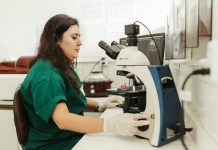
In a new study, researchers found that human aging processes may hinder cancer development.
The research was conducted by a team from the University of Liverpool.
Aging is one of the biggest risk factors for cancer. However, the biological mechanisms behind this link are still unclear.
Each cell in the human body is specialized to carry out certain tasks and will only need to express certain genes.
Gene expression is the process by which specific genes are activated to produce a required protein.
Gene expression analyses have been used to study cancer and aging, but only a few studies have investigated the relationship between gene expression changes in these two processes.
In the study, the team aimed to better understand the biological mechanisms.
They compared how genes differentially expressed with age and genes differentially expressed in cancer among nine human tissues.
Normally, a healthy cell can divide in a controlled manner. In contrast, senescent or ‘sleeping’ cells have lost their ability to divide.
As we age, the number of senescent cells in our bodies increase, which then drive many age-related processes and diseases.
Genetic mutations triggered by things such as UV exposure can sometimes cause cells to replicate uncontrollably—and uncontrolled cell growth is cancer.
Cells are often able to detect these mutations and in response go to sleep to stop them from dividing.
The researchers found that in most of the tissues examined, aging and cancer gene expression ‘surprisingly’ changed in the opposite direction.
These overlapping gene sets were related to several processes, mainly cell cycle and the immune system.
Moreover, cellular senescence changed in the same direction as aging and in the opposite direction of cancer signatures.
The researchers believe the changes in aging and cellular senescence might relate to a decrease in cell proliferation, while cancer changes shift towards an increase in cell division.
The lead author of the study is Dr. Joao Pedro De Magalhaes.
The study is published in Aging Cell.
Copyright © 2019 Knowridge Science Report. All rights reserved.



